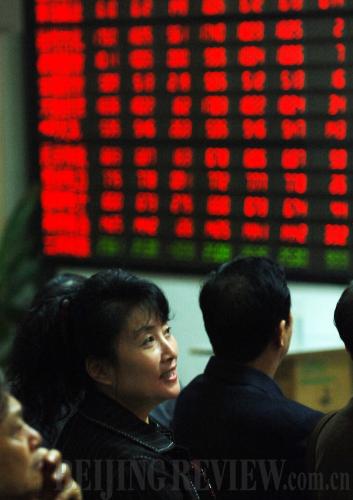|
 |
|
STABILITY FIRST: Analysts believe health and stability are the most important factors for the development of ChiNext (LI JIAN) |
The financial crisis only deepened their wounds. By handing out generous tax breaks and subsidies, policymakers tried to stanch the SMEs' pains, but the difficulty of attaining financing remains a sincere problem to the enterprises' growth and prosperity.
CASM Chairman Li Zibin told Beijing Review that an important alternative source of financing for the SMEs is the capital markets.
ChiNext, for instance, could become an effective channel for them to float their shares and seek financing, said Li.
In addition, it provides an exit for private equity (PE) investors, a long-anticipated boon to lure more PE investments to fuel growth of small firms, he added.
Analysts believe ChiNext, with a relatively low requirement for listing and some system innovations, is a suitable platform for SMEs to go public. Listing on the NASDAQ will no longer be the first choice for many smaller Chinese firms that are seeking direct financing, they said.
Opportunities and risks
The volatile new market means both opportunities and risks, not only for stock investors, but also for the listed enterprises.
Wen Yuechun, Director of the Zhejiang Merchants Securities Research Institute, said the new market can ease the financial woes of the smaller firms and strengthen their ability to press ahead with technological innovations.
For example, many of the firms listed on the SME board on the Shenzhen Stock Exchange have shown significant improvements in market shares and profitability, said Wen.
As a result, ChiNext is likely to serve as a catalyst for startup businesses to take off and push forward technological advances in their respective industries, he said.
Wen added that another benefit of ChiNext is that it provides an alternative for cash-stressed Chinese SMEs that do not have the necessary funds to be listed overseas.
A number of innovation-driven companies, including Sina.com, Baidu and Alibaba, have floated their shares overseas, a move that brought heavy costs and legal risks, he said.
But the market is not without uncertainties, and it remains to be seen whether ChiNext can maintain a healthy growth given the setbacks of Germany's Neuer Market and the Hong Kong Growth Enterprise Market, he said.
In addition, small firms listed on the growth enterprises board will be more vulnerable to hostile acquisitions from bigger rivals and may lose control of corporate management, said Wen.
Due to the relatively small market value, their shares can easily be manipulated by speculators. The PE and VC (venture capital) investors may as well speculate on the fickle new market, instead of investing in startup businesses, added Wen.
A bright prospect
Zuo Xiaolei, chief economist with the China Galaxy Securities Co. Ltd., said she hopes ChiNext can play an active role in stimulating innovation among the startup businesses.
"There is sill room for the market to improve its regulation system so as to create a better investment environment," said Zuo.
The IPO pricing inquiry system with a few large brokerage houses may inadvertently allow for rampant speculation, she said.
Zuo suggested that regulators could take into consideration online inquiries and share issuance systems like those adopted by Google Inc., which was fairer and more reasonable than the inquiry system.
Aside from these steps, measures need to be taken to improve the information disclosure system of the new market, Zuo said, adding that research reports should not rate shares of the ChiNext-listed companies and should also require a signature of approval.
Apart from the upper and lower limit of 10 percent, more rules could be created to rein in speculation on the market, such as temporary suspension of trading, said Zuo.
In the 1970s, the United States established the NASDAQ Stock Market, which provided a strong impetus to the prosperity of Silicon Valley and buoyed economic growth, said Zuo. Similarly, ChiNext will have far-reaching implications for the Chinese economy, she added.
More efforts, however, are still needed to perfect the market's regulatory system and pave the way for its healthy growth before a true comparison of ChiNext can be made with its American counterpart market, said Zuo.
Milestones for the ChiNext
In October 2003, the Second Plenary Session of the 16th Central Committee of the Communist Party of China passed a decision to push for the construction of venture investments and a growth enterprise market.
On January 31, 2004, the State Council issued Guidelines for Promoting the Reform, Opening up and Steady Growth of the Capital Market, stating that the country would advance the construction of the new market.
In August 2007, the State Council approved a scheme guiding the establishment of a multi-faceted capital market system focusing on growth enterprises.
On March 5, 2008, Chinese Premier Wen Jiabao ordered the establishment of the market.
On March 31, 2009, CSRC officially released its rules guiding the initial public offering on ChiNext, effective from May 1.
On July 15, 2009, investors started opening ChiNext trade accounts.
On July 26, 2009, CSRC officially accepted IPO applications from companies.
On August 14, 2009, the first review committee of ChiNext was established.
On September 17, 2009, the CSRC convened the review committee of ChiNext for the first time.
On October 23, 2009, the inauguration ceremony was held to mark the launch of ChiNext.
On October 30, 2009, ChiNext officially opened on the Shenzhen Stock Exchange. | 